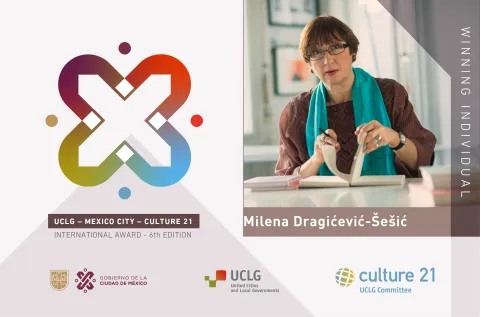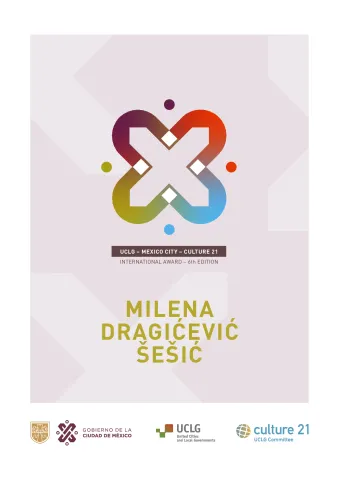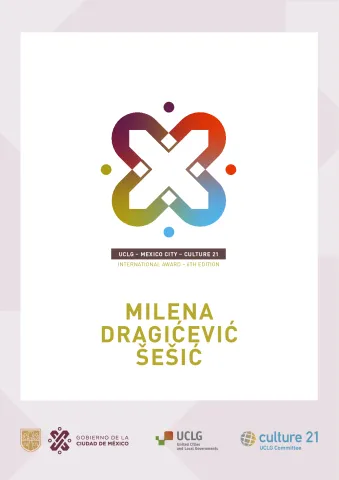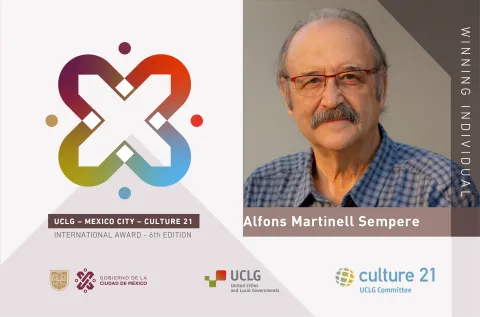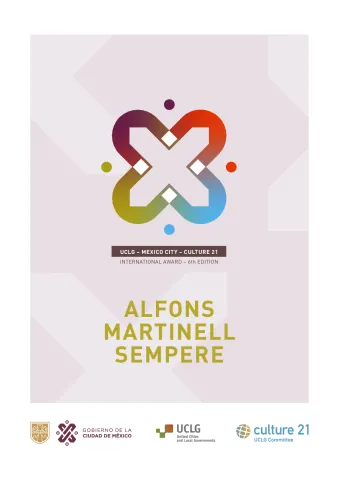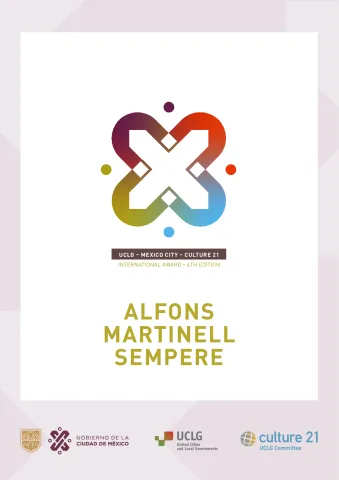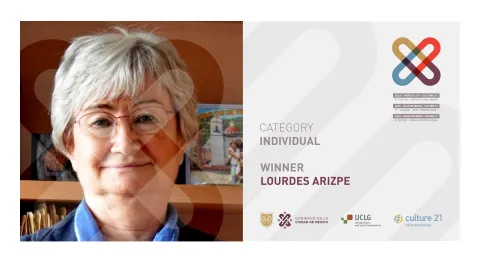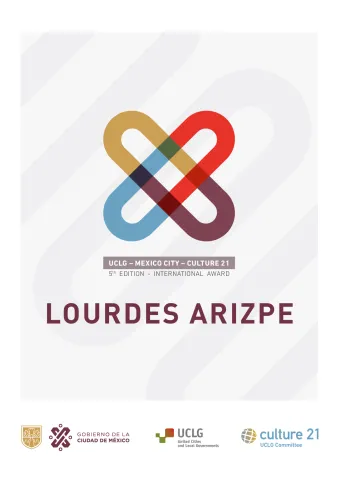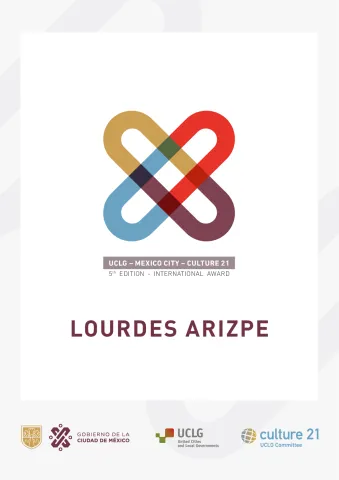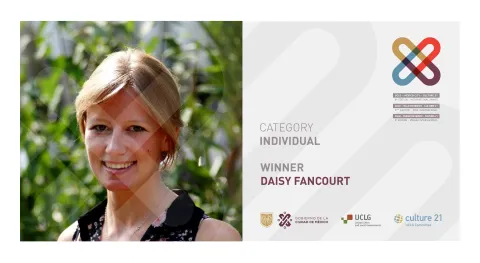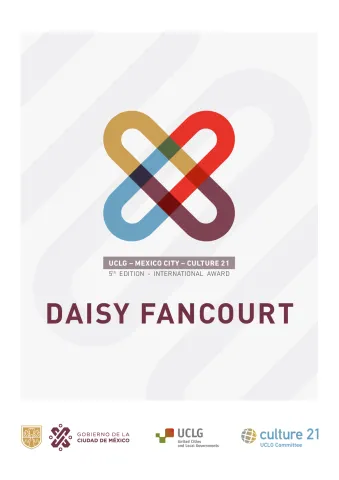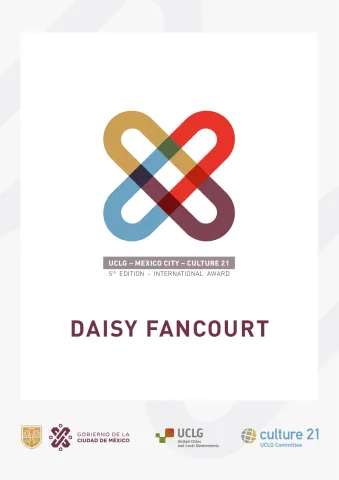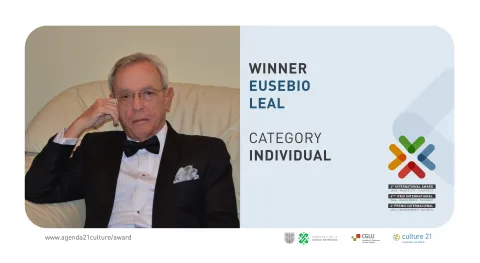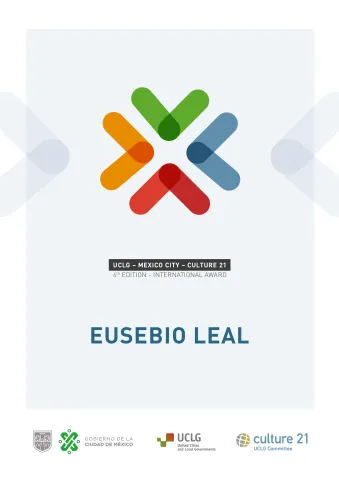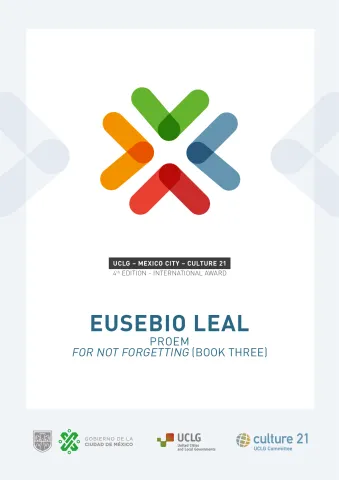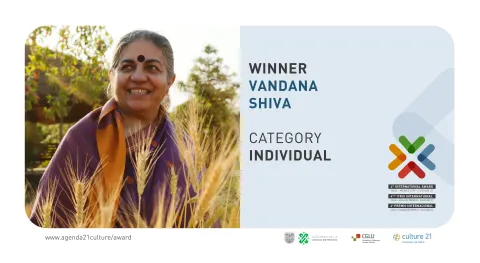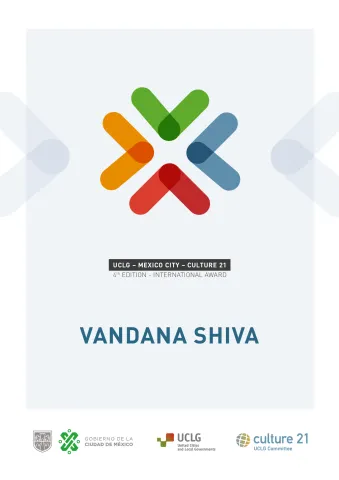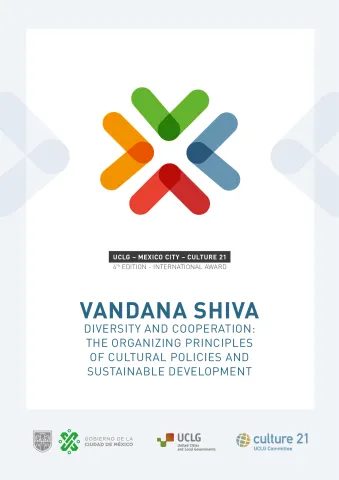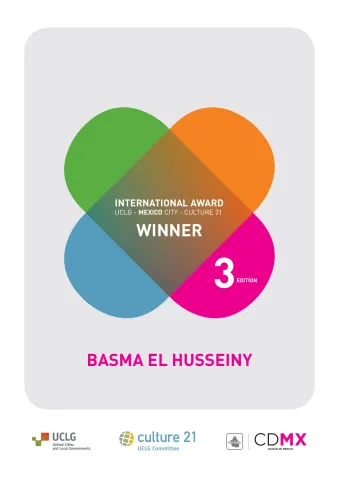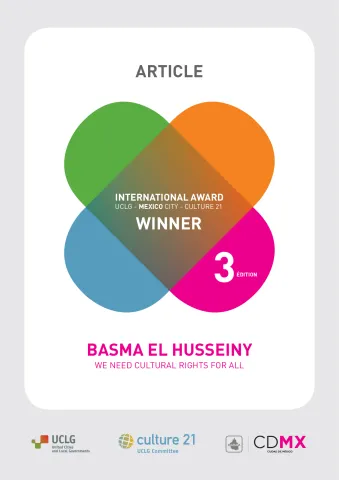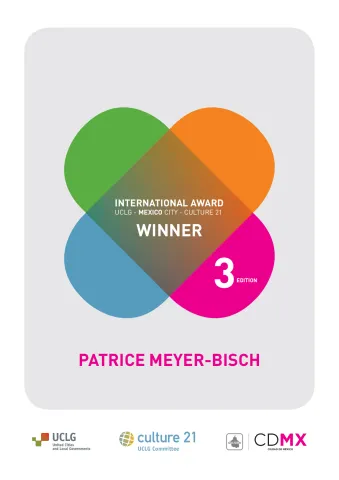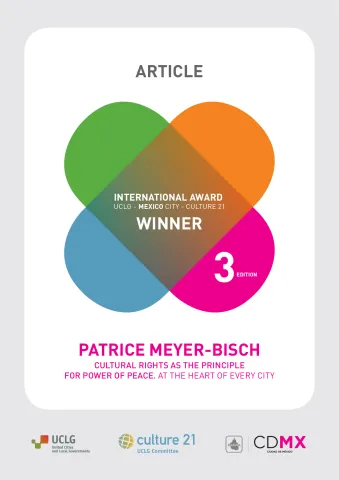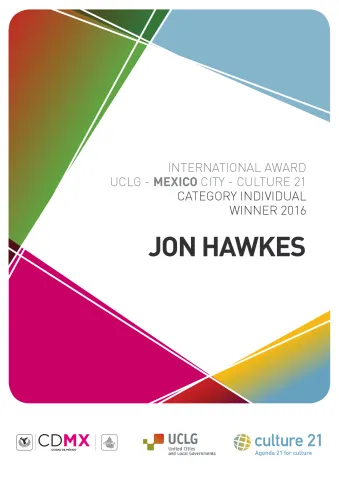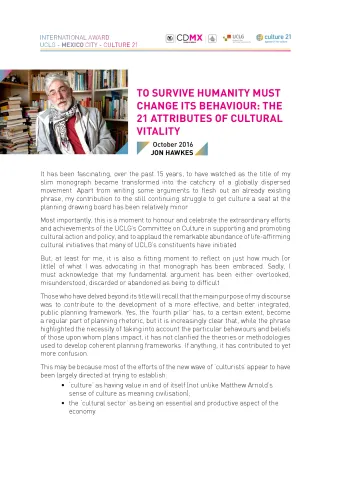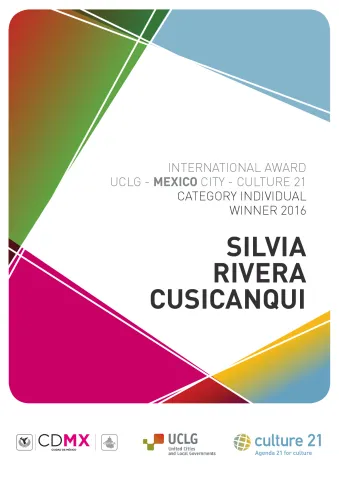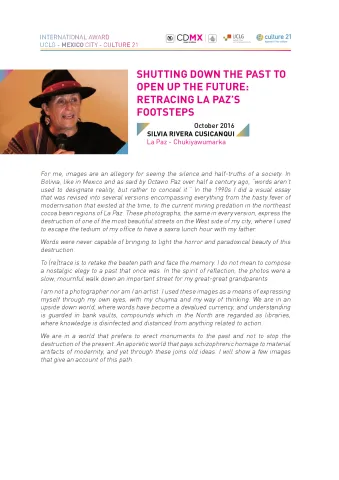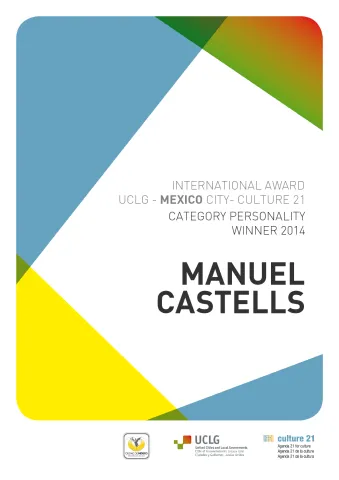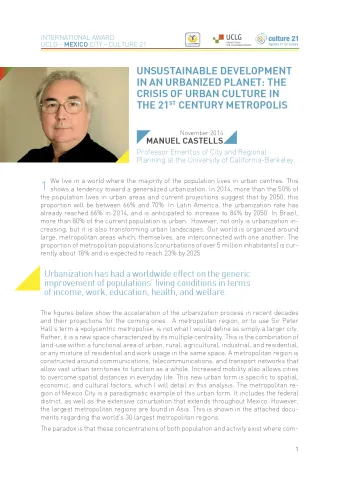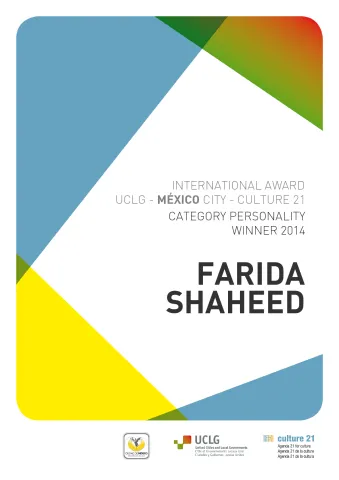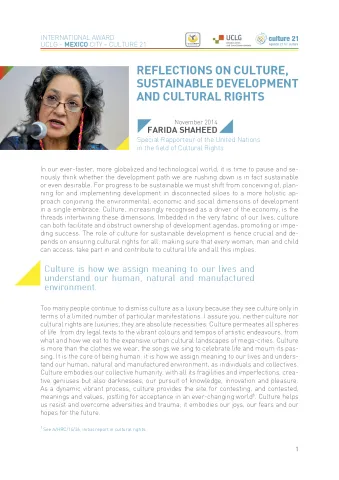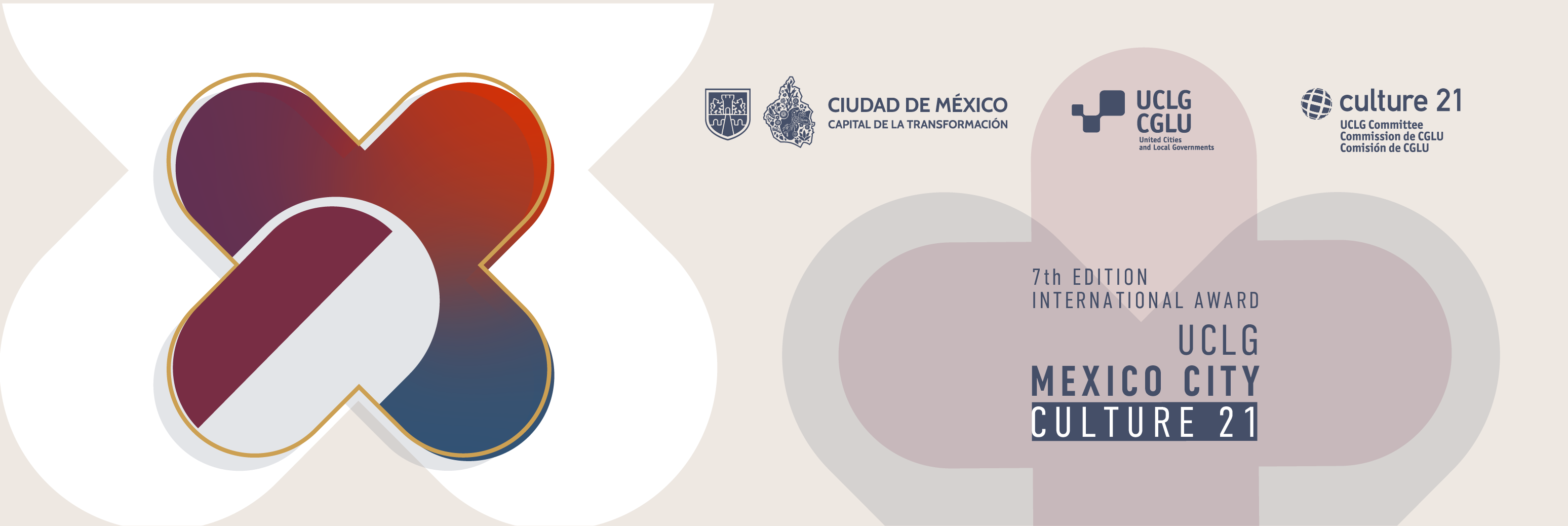
Winning cities
MILENA DRAGIĆEVIĆ ŠEŠIĆ
Professor Emerita of the Faculty of Performing Arts (University of the Arts of Belgrade), former Rector of the University of Arts (Belgrade), and founding director of the UNESCO Chair in Cultural Policy and Management - Interculturalism and Mediation in the Balkans (2004-2019). Milena has an impressive career as professor of Cultural Policy & Cultural Management, Cultural Studies and Media Studies. As an expert in cultural policy and management, Milena has been involved in more than 50 projects, and has participated in numerous public art projects and radical cultural projects and programmes in Europe and in the Balkans as a civil society activist. As an academic and activist, throughout her career, Milena has contributed to training, raising awareness and advocating for cultural policies as a core component in the building of democratic societies. While originally from Eastern Europe, her engagement has been visible across Europe, the Middle East and North Africa and Asia, developing strong networks of collaboration at the international level. Among other positions, she has been the President of the Cultural Policy Research Award (European Cultural Foundation, Amsterdam); the President and current Member of the Board of the European Diploma in Cultural Project Management (Association Marcel Hicter, Brussels), and has been a Board Member of ENCATC and ELIA.
ALFONS MARTINELL SEMPERE
Professor at the University of Girona (Catalonia, Spain), and co-director of the Pau Casals UNESCO Chair (on music and promotion of Peace and Human Rights). He was the founding director of the UNESCO Chair on Cultural Policies and Cooperation at the University of Girona (2000 - 2014) and also the founding President of the Interarts Foundation (1995), in an initiative shared with Eduard Delgado and Eduard Miralles. In 2004-2008, Alfons served as Director General of Cultural and Scientific Relations of the Spanish Agency for International Cooperation (AECID) and he was key in the launch and implementation of the "Culture and Development" Window of the UNDP Millennium Goals’ Achievement Fund. Alfons is one of the global leading experts in the field of Cultural Policies, Cultural Management, Cultural Cooperation and Development. He has taught in universities in Spain, Europe, Latin America and Africa, and has given a founding footprint to many academic and civil-society led initiatives in these fields. He has also contributed to the training of hundreds of cultural managers, officials and officers, as well as through countless publications, conferences and research projects, to a better (and action-oriented) understanding of the relationship between culture and sustainable development. He has also addressed, in recent years, the relationship between culture and the SDGs and how to strengthen this connection with a standalone Culture Goal.
DR. LOURDES ARIZPE
Dr Lourdes Arizpe was appointed Secretary General and member of the United Nations Commission on Culture and Development at the same time that she was managing cultural projects in many countries of the world as UNESCO's Assistant Director General for Culture. As a consultant for UNESCO, she participated to the Convention for the Safeguarding of the Intangible Cultural Heritage as well as to the Convention on the Diversity of Cultural Expressions. Elected President of the International Social Science Council (ISSC), she was Chairman of the Governing Board of the UNRISD: United Nations Centre for Social Development Studies in Geneva. She also served on the Governing Board of the Bibliotheca Alexandrina.
Dr. Arizpe holds a PhD in social anthropology from the London School of Economics, and was Director of the Institute of Anthropological Research. She also was researcher at the Regional Centre for Multi-disciplinary Research at the National Autonomous University of Mexico, as well as Secretary of the Mexican Academy of Science. She also directed the National Museum of Popular Cultures of Mexico. She has received awards and distinctions from Mexican, European and Asian universities. Among her most recent publications: “Cultura, Transacciones Internacionales y el Antropoceno” (CRIM-UNAM, M. A. Porrúa, 2019) - also published in English by Springer-MacMillan, “Renovación y futuro del patrimonio cultural inmaterial en México” (CRIM-UNAM, 2017) and “Lourdes Arizpe: a Pioneer in Mexican Anthropology” (Springer Verlag, 2014).
See the biography of Dr. Lourdes Arizpe.
See the article elaborated by Dr. Lourdes Arizpe and her teams.
Dr. DAISY FANCOURT
Daisy Fancourt. The work of Dr Daisy Fancourt has decisively contributed to prove the benefits of cultural activities for people’s health. She is Associate Professor of Psychobiology & Epidemiology and Head of the Social Biobehavioural Research Group at University College London. She studied at Oxford University and King’s College London before completing her PhD in psychoneuroimmunology at University College London. Her research focuses on the effects of social factors on health, including social deficits (e.g. loneliness and social isolation) and sociocultural assets (e.g. community engagement, arts & cultural activities, and social prescribing). Dr Daisy Fancourt is also the Director of the World Health Organisation Collaborating Centre on Arts and Health (www.artshealthcc.org) as well as a member of the WHO Technical Advisory Group on cultural and behavioural insights on health.
The report “What is the evidence on the role of the arts in improving health and well-being? A scoping review”, based on the review of over 3000 studies was worldwide disseminated and acclaimed. The report and subsequent theoretical work from Dr Fancourt has shown that arts and culture combine many different components (‘active ingredients’) that are beneficial to health, for example involving the imagination, sensory activation, cognitive stimulation and social interaction. In further work published in the Lancet Psychiatry, Dr Fancourt has then shown that these components can prompt over 600 different psychological, physiological, social and behavioural mechanisms which are linked-in with the prevention, management and treatment of a range of different health conditions. Through Dr Fancourt’s publications, the beneficial impact of cultural activities has a renewed scientific evidence base. The promoting of artistic and cultural engagement at the individual, local and national levels is becoming essential in public policies for sustainable development.
See the biography of Dr. Daisy Fancourt.
See the article elaborated by Dr. Daisy Fancourt and her teams.
He has devoted his entire life to the preservation of the historical and cultural heritage of Cuba and of humanity. Dr Leal’s distinguished sensibility, as well as his early incursion into public administration, allowed him to understand the scope and value of the cultural heritage of cities, particularly Havana, both for its citizens and for the rest of the world. He is Honorary President of the Cuban Committee of the International Council of Museums (ICOM) and Honorary President of the Cuban Committee of ICOMOS and of the Civil Society Heritage, Community and Environment; Professor Emeritus of the University of Havana and Doctor Honoris Causa in various prestigious universities worldwide. He chairs the Network of Offices of the Historian and Conservator of the Heritage Cities of Cuba. Throughout his professional career
he has promoted the embodiment of the public space as a cultural space, preserving heritage as a common good through the restoration and conservation of the different works and projects he has been in charge of, with special emphasis on the Historical Centre of the city of Havana. Havana is today a complete and absolute symbol of this effort. For Dr Eusebio Leal, the city is highly representative of all the cultural, intellectual, political, historical and social values of the Cuban people, and it is also a great memory of the architectural development that succeeded in making Havana one of the most important post-colonial cities in Latin America.
Vandana Shiva is one of the pioneering figures of ecofeminism most recognized worldwide. Born in Dehradun, India, Ms Shiva is doctor of Physical Sciences, philosopher of science, ecologist, feminist and pacifist. She directs the Research Foundation for Science, Technology and Natural Resource Policy (RFSTN) in India, which she founded in 1982. She is also the founder of Navdanya, a movement focused on women and dedicated to the promotion of biological and cultural diversity. In her defence of the food cultures treasured by indigenous peoples and their cultural and natural heritage, Vandana Shiva has explicitly linked issues such as food security and climate emergency to neoliberalism, cultural relativism, and the colonization and spoliation of traditional agricultural knowledge. In this sense, she has provided keys to place culture at the core of the global debate on humanity’s challenges. She has especially helped put women and girls, and biodiversity at the forefront of the fight to implement human rights policies, the Sustainable Development Goals, and other global agendas. Her approach to ecofeminism emphasizes scientific knowledge and dissemination as tools to preserve biodiversity and the autonomy of food cultures, and to guarantee people’s cultural rights, including the most at-risk groups, without leaving anyone or any place behind.
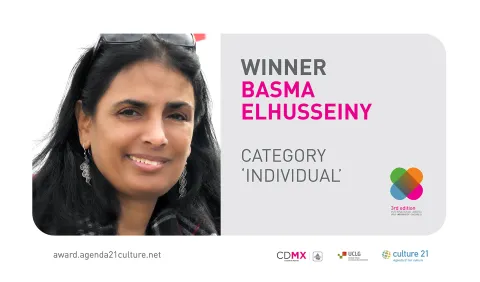
Cultural manager and activist. Basma El Husseiny is now leading the organisation Action for Hope, based in Beirut, that seeks to provide cultural relief and cultural development programmes to communities in crisis, with a focus on refugees and impoverished communities. She has been involved in supporting independent cultural projects and organizations in the Arab region for the past 30 years.
Basma was the Arts Manager of the British Council in Egypt (1988-1998) and the Media, Arts & Culture Program Officer for the Ford Foundation in the Middle East and North Africa (1999-2003). In 2004 she founded Cultural Resource – Al Mawred Al Thagafy, the Arab region’s leading independent cultural organization, and was its director until September 2014. In 2006 she also co-founded the Arab Fund for Arts & Culture (AFAC), and was a founding trustee until 2009. She also co-designed the Master’s Degree in Cultural Policy and Cultural Management at the Hassan II University in Morocco.
Basma is a UNESCO expert in cultural governance, member of the Arab Cultural Policy Group, previous member of the Advisory Board of the Center for Cultural Policy and Management, at the Bilgi University in Istanbul and the Egypt representative of the Arterial Network (Africa’s largest cultural network).
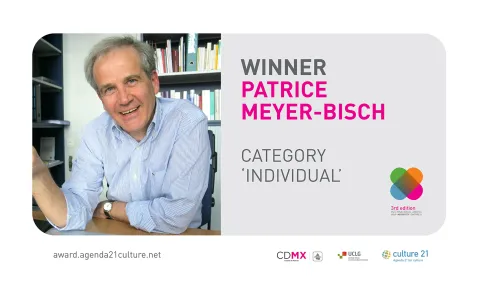
He holds a PhD in Philosophy from the University of Fribourg, Switzerland, and completed a professorial thesis on Political Ethics at the University of Strasbourg, France. Until 2016, he coordinated the Interdisciplinary Institute of Ethics and Human Rights (IIEDH) at the University of Fribourg, and he currently chairs the Observatory on Diversity and Cultural Rights (an IIEDH programme established in 2004) and the UNESCO Chair in Human Rights and Democracy, at the same university.
He is well-known for his work in the field of cultural rights at an international scale, as the main promoter of the Fribourg Declaration on Cultural Rights (2007), the result of 20 years of work by an international group of experts, known as ‘the Fribourg Group’, which fosters cultural rights within the human rights system. Patrice Meyer-Bisch has conducted research in several European and African countries.
He has significantly influenced the understanding of cultural diversity and cultural rights as ways to achieve inclusive sustainable development for everyone and in all areas, through the effective implementation of the interdependency of human rights. In the context of these activities, cultural rights are understood, alongside economic rights as well as civil, political and social rights, as the basis, the ‘grammar’, the space for interpretation, for the development of all individuals and societies.
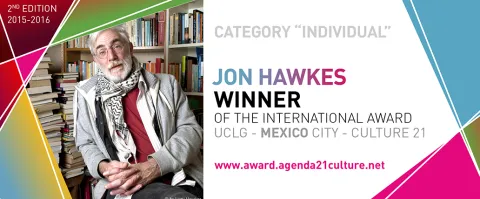
Author of the book "The Fourth Pillar of Sustainability: culture's essential role in public planning". With this book, Hawkes significantly contributed to transforming the basic structure of public policy making. The core concept that informs his work has become central to many policy development strategies at the local level throughout the world. By proposing culture as a fourth perspective from which to view sustainability (and indeed, all of the key concerns of public policy), Hawkes not only raised culture to the same level as the three traditional dimensions of policy development – economic, social and ecological – he also helped to focus the "sustainability" discourse on culture. For Hawkes, culture "has always been a process rather than a product" and its value "lies in its making far more than in what is made." Consequently, locally generated cultural action becomes the key to sustainable development and takes place within and between communities. Without a vital and inclusive public culture, imagining a future (what else is planning?) can never be effective or wholesome. Always committed to practical local action, Jon currently works with Melbourne-based organisations, Ilbijerri Aboriginal & Torres Strait Islander Theatre Co-operative, The Substation Multi Arts Centre and J-Studios, an artist run studio collective.
Website: ‘The Hawkes Library’.
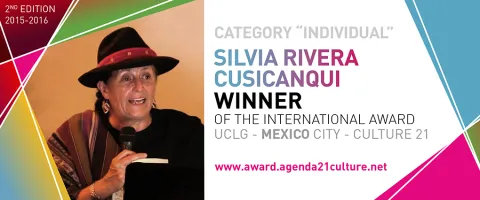
Sociologist and activist, she is a member of the free independent collective Colectivx Ch’ixi in Bolivia. Silvia Rivera Cusicanqui has been professor of Sociology at the Universidad Mayor de San Andrés in La Paz (UMSA), where she is now Emeritus Professor, and has been a visiting lecturer at the Universities of Columbia (New York, USA), Austin (Texas, USA), La Rábida (Huelva, Spain), Jujuy, and the Universidad Andina Simón Bolívar (Quito, Ecuador). Along with other intellectuals, in 1983 she founded the Andean Oral History Workshop (THOA), a self-managed group which focuses on orality, identity and the indigenous and popular social movements, particularly in the Aymara region. In the last few years she has also been involved in the setting-up of El Tambo Colectivo, a cultural centre in La Paz which aims to combine academic knowledge, manual work and environmental practices. She is the author of several books, and she has also directed fiction and documentary videos and films. Silvia Rivera Cusicanqui’s work deals with continuity in the logic of domination of indigenous identities and cultures, including in those contexts where diversity and the value of indigenous cultures have been officially recognised.
Website (in Spanish): www.colectivachixi.blogspot.com.es
Facebook (in Spanish): facebook.com/colectivxchixi
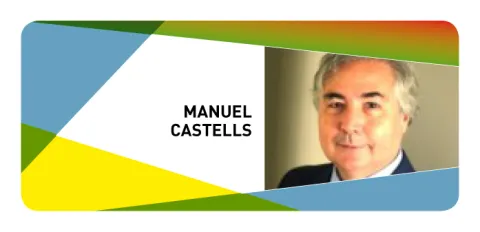
Professor Emeritus of Sociology and of City and Regional Planning of the University of California at Berkeley and Professor of Sociology and Director of the Internet Interdisciplinary Institute (IN3) in the Universitat Oberta de Catalunya. Manuel Castells’ work has emphasized the important role of social movements and new technologies in the transformation of the city. He has documented urban transformations, recognizing the important role that culture plays in these processes. He has promoted a more decisive role of cities and local governments in a globalization created by and for the people and social movements. He has systematically advocated a new model of sustainable society which includes diversity, locality and creativity as basic elements. He has promoted the concept of “project identity” to describe the collective action needed to guide the future of all societies.
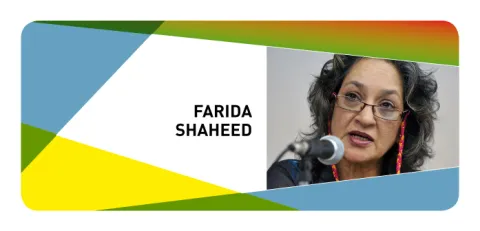
Pakistani sociologist, Farida Shaheed has worked on projects which incorporate culture to reinforce human rights. Her career in the United Nations began in 2009 as an independent expert and since 2012 she has been the Special Rapporteur in the field of cultural rights. From her position, Shaheed has proposed several initiatives to integrate culture and human rights. Farida Shaheed’s periodic reports are fundamental references in the relationship between culture, human rights and sustainable development. She has identified and documented the main challenges of cultural rights present in our societies, including the freedom of artistic expression, memory processes and cultural rights of women. She is an essential reference in the struggle for explicit consideration of culture in the Post-2015 Sustainable Development Goals of the United Nations.

